Today’s power moms are decidedly 21st century: tech savvy, entrepreneurial, heavily connected and growing like crazy.
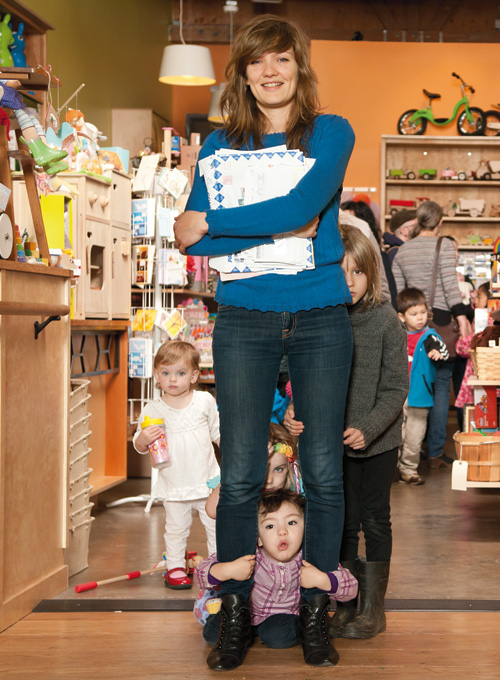 |
SpielWerk’s owner Stacee Wion is surrounded by eager children in her Portland toy store, which includes a play area for kids. “Our customers are really family for us,” Wion says.// Photo by Eric Näslund |
Like a baby, Tsh Oxenreider’s Simple Mom blog started out small, then grew like a weed until it took on a life of its own. “I didn’t start blogging with the idea to make money or to create a ‘mom blogger empire,’ but once I saw I had the knack for it, I became much more intentional in my business plan,” says Oxenreider, a Bend mother of three.
The 34-year-old started Simple Mom — “a productivity blog for home managers” — as a hobby in 2008, and today oversees Simple Living Media, a collection of four blogs on topics dear to a simple mom’s heart: food, school and kids. Although Oxenreider declined to reveal revenues, she says she earns a full-time income. “Last year we did well, and we’re slated to do even better this year.”
Oxenreider is one of an estimated 3.9 million women with children who blog in the United States. Although only a small percentage are making a full-time income, mom bloggers and their readers are an indelible part of what might be termed the 21st century mommy economy: mothers who are leveraging social media, as well as interest in community and environmental issues, to launch a new wave of mom-oriented businesses or to influence the purchasing and development of mom-oriented products.
Unlike a previous generation of mothers who owned businesses, today’s “power moms,” also known as “mompreneurs” and “mommy influencers,” are decidedly 21st century: technologically sophisticated, entrepreneurial and heavily connected, online and off. Nationwide, their numbers are growing rapidly. There are about 8 million women-owned businesses, a figure that increased by 50% between 1997 and 2011 — a rate 1.5 times the national average. During approximately the same time period, the number of women who chose to stay at home and raise children increased 15%.
“A few years ago, you saw a huge growth of mom-owned businesses,” says Maria Bailey, CEO of BSM Media, a Fort Lauderdale-based marketing firm, and the author of several books about the mom market, including Mom 3.0 and Power Moms. That increase, Bailey says, “was fueled by the economy and a new wave of millennial moms who are very tech savvy.” Unlike their boomer parents, Bailey adds, today’s mothers are also “striving for a more integrated lifestyle” in which work and parenting endeavors support one another.
Collectively, these social and economic conditions are reshaping the traditional relationship between business and mothers, giving advertisers more targeted ways to reach the $1.7 trillion mom market while providing mothers with new opportunities to shape business practices, products and brands. The demand for mom goods and services is growing steadily.
“Not only are individual mothers in a position to create businesses they weren’t in before, but even if you’re not interested in starting a business you can have a voice,” says Asha Dornfest, a Portland mom who runs Parent Hacks, a site the national online magazine Babble named as one of the top 50 mom blogs in the country last year. “And once you have that voice, companies will listen.”
In the past, an enterprising stay-at-home mom might have worked for Amway or Avon. “Today you don’t need the paternalistic arm of a corporation behind you,” says Dornfest. “You can potentially create something that has huge impact with you and a $15 a month blogging account. That is a huge difference.”
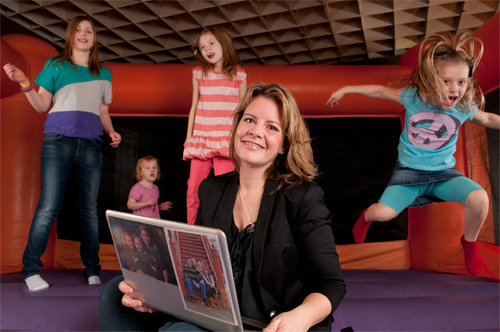 |
A former executive with KinderCare, Kelley Peake opened Play Boutique so she could spend more time with her family and achieve a better work/life balance. The indoor playground and café “is a great place for moms to meet other moms and relax a little bit,” says Peake.// Photo by Eric Näslund |
Like “supermom” and “opt-out mom,” “power mom” is something of a media-generated term; few women fit so neatly into a single category. With that disclaimer, power mom is also a good faith effort to describe an emerging reality. In the late 1990s, authors Patricia Cobe and Ellen Parlapiano coined the word “mompreneur,” which typically refers to a woman who left the workplace to raise children, then launched a business instead of returning to work. But as such businesses grow in number and clout, even that term is becoming outdated, many women business owners say.
“Mompreneur — it’s like, ‘Oh, that’s cute, you have a business,’” says Marlynn Schotland, who founded Power MOB, a professional organization for mom-owned businesses in 2006. A former public relations director for the Art Institute of Portland, Schotland, 38, left the corporate world after the birth of her first child, and now owns a design and strategy studio in addition to working as a regional district manager for Plum District, a San Francisco-based daily deals site aimed specifically at mothers.
“We call ourselves the mom sales force; flexing our professional skills while making calls around drop-off time.” (Power MOB shuttered last year, and Schotland now holds informal mom’s networking events).
A subset of women business owners, power moms/mompreneurs embrace their essential mommy-ness, with products, services and/or aspirations that revolve around kids and families. Historically, such enterprises have been ignored by the entrepreneurial community. But in the past couple of years, “investors and VCs are definitely starting to take note,” Schotland says. One example is Plum District, which recently went through Series C funding in addition to acquiring two other companies.
Bound by their common maternal ownership, the businesses themselves run the gamut: big and small, virtual and brick and mortar. In Oregon, which has about 108,000 women-owned firms, up 35% since 1997, mom-owned businesses gDiapers and Little Busy Bodies, which makes Boogie Wipes, a saline wipe for kids, have hit the big leagues. The former has increased sales 50% annually since 2005 and recently expanded into Great Britain and France. Beaverton-based Little Busy Bodies grossed $10 million last year, and is in the process of being partially acquired by Nehemiah Manufacturing, a Cincinnati-based company. Co-founder Julie Pickens, who refers to herself as a “Boogie Mom,” will retain her ownership in the company.
Smaller enterprises include Play Boutique, a Beaverton and Lake Oswego hybrid indoor playground/cafe/school founded by Kelley Peake; SpielWerk Toys, a traditional toy store in Northeast Portland; and Wyatt-MacKenzie, a Deadwood, Ore.-based publisher of books authored almost exclusively by moms, among them Bailey’s Mom 3.0.
Today’s mompreneurs are as diverse as any group of entrepreneurs. But there are some common features. If today’s crop of mom businesses differ from those in the past, one reason is a demonstrated interest in building community, a mother-hen sensibility that intersects with a business environment favoring both the local neighborhood store and global online gathering places. Thus SpielWerk’s owner, Stacee Wion, says she was inspired to create “a community resource, a place where families and kids grow with us.” She also is planning a line of locally crafted toys. For her part, Dornfest, a former technical writer, says she started Parent Hacks “not to make money, but to create a place for community … where parenting is as much about hacks as real expertise.”
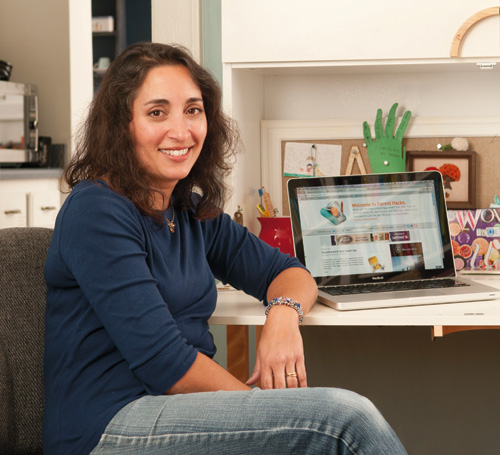 |
Asha Dornfest works on Parent Hacks from home. The site receives about 100,000 visits a month.// Photo by Eric Näslund |
Of course, in a world where community and commerce are increasingly conflated, selflessness, coupled with self-expression, looks something like a career path. And like Simple Mom’s Oxenreider, Dornfest’s modest aspirations eventually turned into something grand.
Seven years after launching Parent Hacks, Dornfest not only earns about $30,000 annually, she has also parlayed the blog into a book deal — Minimalist Parenting: Enjoy Modern Family Life More by Doing Less, co-written by Christine Koh — and was recently tapped by the anti-poverty group ONE to be one of the organization’s ambassadors during an upcoming “ONEMoms” trip to Africa. “I have the opportunity to write this book because I started the blog, and now I have opportunities that are potentially global in their reach. The new digital cottage industry lets you do that.”
The proliferation of Internet technologies has made it easier for everyone, men, women and children, to start a business or make their voices heard. But social media and mobile technologies are also uniquely suited to the millennial mother, mom watchers say. After college students, mothers are the second most viral community online. According to eMarketer, mothers are also more likely to visit blogs than the average online user.
To be sure, moms have always shared parenting tips. Today, the venue has simply shifted from the back fence to the web. But other forces are driving moms online. Compared to previous generations, today’s mothers face “extreme anxiety,” fueled by a surge in single mothers, environmental concerns and a proliferation of consumer choices, says Kit Yarrow, a consumer psychologist at San Francisco State University. In a world where anything goes, “moms are looking to other moms and brands for help” carving out the right path.
Tiffany Larson, a 34-year old Portland mom who blogs for Oxenreider’s Simple Living, is a case in point. In the mommy economy vernacular, she is a classic “mommy influencer,” a mom who uses blogs, Twitter, Pinterest and Facebook to disseminate and share opinions about products, brands and business practices. After her son was born, says Larson, she started researching healthy foods and home products. “I would find information on the web that made me think there were safer products out there than the ones I was using, and I decided to share them with other people.”
A recent blog post focused on alternatives to canned packaging; Larson also purchases books and food products based on recommendations from readers. This past winter, she notes, Campbell Soup decided to phase out use of BPA liners, a change in strategy that was driven by a grassroots social media campaign from moms. “There is a misconception about mommy blogs as fluffy material,” Larson says. “But that gets me excited — that moms have some power.”
In a country where mothers control about 80% of household spending, that power is not lost on companies targeting the mom demographic. “The most critical thing we’ve learned in our research is that you cannot underestimate the power of her-to-her product recommendations,” says Elisa Page, co-founder of BlogHer, a community and media company. Women form “circles of trust” online and trust those circles more than other sources, Page says. “We’re not listening to E.F. Hutton any more. We’re listening to each other.”
Aiming to be part of that dialogue, major brands are doing more than placing ads on mommy blogger sites or getting moms to blog about specific products — strategies many marketers say are already becoming passé. As Page puts it, today’s companies should “join the conversation, not interrupt it.” That philosophy informs Huggies’ “mom-inspired grant program,” which awards $15,000 to moms to help turn homegrown parenting ideas into innovative products. It also explains why gDiapers has 36,000 active Facebook fans and 500 parent posts a day on topics such as home births and breastfeeding. “Even though it’s a diaper brand, what’s bringing people to our site is that we’ve created a community of people who share similar values,” says president Kim Graham-Nye.
Mom-oriented companies are now building and targeting communities offline as well. Thus gDiapers hosts regular “gTeas,” and Schotland spreads the word about Plum District as co-president elect of her school’s PTA. Cynics might claim that such mom-specific community-building, along with a focus on “power moms” and the “mom market,” is simply another way to co-opt contemporary motherhood.
A hallowed political symbol, mothers have always been supported more in theory than in practice; their actual work, be it housework, childcare or business, is often dismissed or devalued. But the increase in women- and mom-owned businesses, and the values such companies embody, suggests the scales are beginning to tip in favor of maternal empowerment. Today’s flexible, networked, product-recommendation driven entrepreneurial culture is also about as close as it gets to a multi-tasking, advice-giving, and community-building mompreneur. Mothers are natural innovators, says Maria Bailey of BSM Media, noting “mompreneurship tracks closely when mom has a baby. Suddenly she has all this new need for products, and starts to see that the product she needs she can’t find.”
In the past, business has been slow to recognize and nurture that potential. Not today, when signs point to a society making way for the new, 21st century mother of invention.
 TSH OXENREIDER
TSH OXENREIDERSimple Living Media
“I sold my first sidebar ad six months after I launched, mostly for what I called latte money. I then wrote an e-book to sell on the blog, which sold enough in another six months to pay off all my school loans and to grab the attention of a publishing house. I signed my first book contract, and it was released in bookstores in late 2010. I love that I can earn a full-time income for my family while staying home with them.”
 KIM GRAHAM-NYE
KIM GRAHAM-NYEgDiapers
“One of the things I’ve been reflecting on in the last few months is very few companies are startups when the founders are in the midst of early childhood. We were setting up the DNA of the company at the moment we had a 2-year-old and were pregnant with the second. It gave us a unique perspective on business in that moment of time. It meant the entire structure of company is based in a family-centered approach.”
 STACEE WION
STACEE WIONSpielWerk Toys
A shortage of natural organic toys prompted Stacee Wion and former partner Sonja Barclay to open SpielWerk Toys in Portland in 2006. “Free and open uninhibited play is the tool by which children develop and we didn’t feel what was on the mainstream market was appealing to the best interest of children,” says Wion, 38. Instead of “mental and interactive” toys — currently all the rage — SpielWerk provides kids with open-ended physical experiences, such as a soft-faced doll with just a suggestion of a human face “so children create the character.” To compete with lower-priced national and online retailers, the store offers customers an environmentally friendly community-based shopping experience featuring a play area and a selection of locally crafted toys. Wion, who grossed $400,000 last year, also sponsors children’s craft activities during neighborhood events such as Sunday Parkways and is expanding the business to include commercial playscape design and residential playscape consultation. The mother of three children, Wion lives two blocks from the store’s North Williams location. Her 16-year-old son was recently onsite helping her break down boxes. “We have the relationship of being part of the village,” says Wion.
 MARLYNN SCHOTLAND
MARLYNN SCHOTLANDPlum District, Urban Bliss
“Moms love Facebook, Pinterest, Twitter. We’re tied to our cell phones because we’re always on the go and it’s easy to check in with the rest of the world quickly while waiting in the carpool lane at school. At Plum District, our district consultants are featured along with their offer pages; they share why they brought that deal to the table. The Internet has made mom-specific advertising more accessible.”
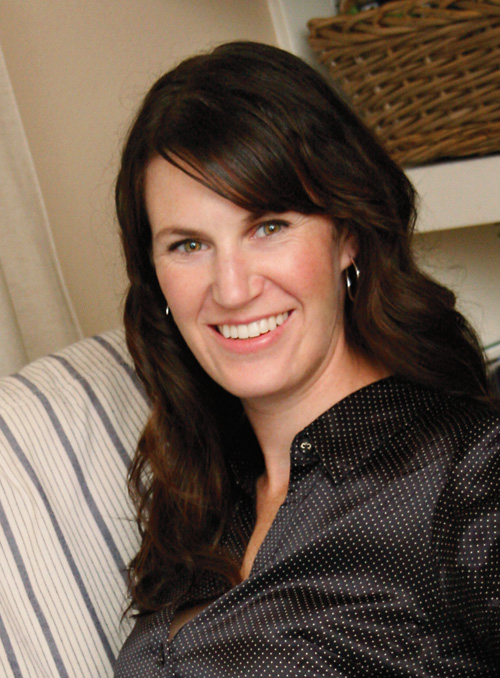 TIFFANY LARSON
TIFFANY LARSONSimple Homemade
“In the last year, I’ve learned a lot more about making money on blogs. I used to do product reviews but if I subscribe to a blog, I don’t want to read a review every day. It makes for boring reading. I blog because I love to write and I want to be involved with a community of green-minded moms. To make money, I’m also looking at writing an e-book about homemade personal care and household products.”
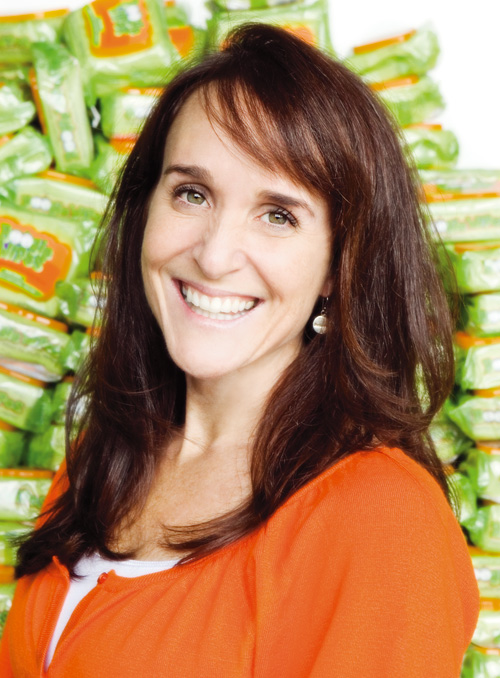 JULIE PICKENS
JULIE PICKENSLittle Busy Bodies
“If you have a product by moms and for moms, then it’s a pretty smart move to make that part of your marketing campaign.” That’s Julie Pickens’ take on being a mom business mogul. The 45-year-old CEO of Beaverton-based Little Busy Bodies, maker of Boogie Wipes, Pickens and business partner Mindee Doney created the saline wipe after looking for a solution to their kids’ runny noses. “This was going to be our little project,” says Pickens. “It turned into a monster.” Revenues last year reached $10 million, up from $6.5 million the year before, and in June 2011, Little Busy Bodies expanded into the teen and adult market. The company’s 15 employees all work on flex schedules, and company marketing focuses on “really talking to our consumers and moms and getting them behind the brand.” A self-proclaimed, and trademarked “Boogie Mom,” Pickens shares her business savvy through her Business of Being a Mom blog and is planning weekend seminars “to give moms marketing, sales and financing 101s.” Pickens says Oregon is a good place for women interested in starting up companies, citing the Oregon Entrepreneurs Network as a resource. Mompreneurship, she says, “is one of those things catching on everywhere.”
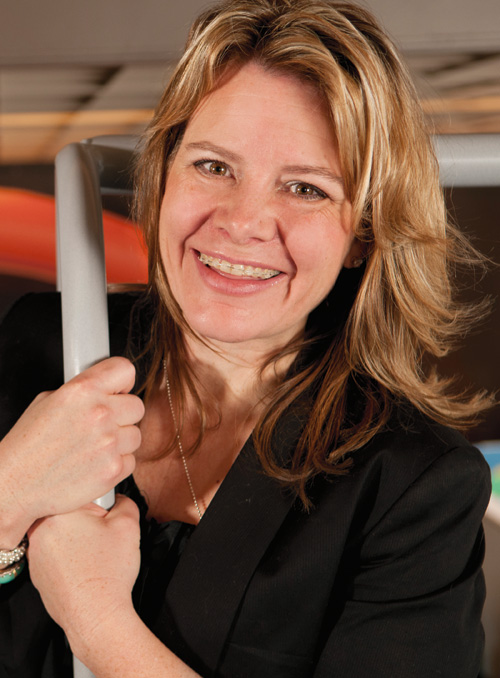 KELLEY PEAKE
KELLEY PEAKEPlay Boutique
A former head of business development for KinderCare, Kelley Peake, 38, opened Play Boutique in Lake Oswego in 2006, and a second location in Beaverton opened this past February. Featuring an indoor play park, licensed school and a café serving beer and wine, Play Boutique aims to give parents and kids opportunities to play separately and together, says Peake, a mother of three. “Our whole premise is helping families achieve that work-life balance.” Local schools are the target market and word of mouth has built the brand in the community. “It’s no secret moms are a truly viral marketing environment,” she says. “They really spread the word.” A low-margin business, Play Boutique charges $7 to come in and play. But even in a down economy, the customer base is growing. Play Boutique, which employs 18 people, grossed $590,000 in 2011, and Peake’s business plan includes attracting investors, expanding into other locations and possibly franchising. A build-out costs hundreds of thousands of dollars. “It’s a great business, but parents are the pickiest customers you could ever have,” Peake says. “You’re dealing with their most prized possessions.”
 NANCY CLEARY
NANCY CLEARYWyatt-MacKenzie Publishing
A former graphic designer, Nancy Cleary got her start helping mothers who were entrepreneurs package their products, a career that evolved into “opening up the whole world of publishing to moms.” Named after her two children, Deadwood, Ore.-based Wyatt-MacKenzie launched in 1998 and was in the red for the first five years. “Now it’s amazing we are growing so fast,” says Cleary, whose 205 titles include Gina Bennett’s National Security Mom and Laurie A. Couture’s Instead of Medicating. “We give moms a place to publish that is outside of the big old-boys network with much more connection and relationship and mutual partnerships.” For many entrepreneurial authors, book sales are not the end goal, says the 44-year-old Cleary, who also has an author consulting division. “It’s about the opportunities publishing can lead to. Whatever that next step is, a book is a business card for an upsell.” All books published by Wyatt-MacKenzie are released on Kindle and Nook. Skype, teleseminars and other web technologies have also made it possible for Cleary to run a global business from a rural Oregon community. Not that there aren’t a few challenges. Says Cleary: “One of the first books I published didn’t want Deadwood on the title page.”



